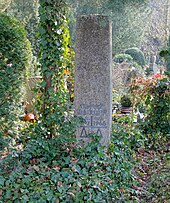Max Silberstein
Max Silberstein (born April 3, 1897 in Mannheim ; † September 4, 1966 there ) was a German lawyer. From 1955 to 1963 he was President of the Karlsruhe Higher Regional Court .
Life
Silberstein studied law at the Ruprecht-Karls-Universität Heidelberg from 1915 , after a semester in Munich back in Heidelberg, where - after being called up shortly before the end of the First World War - he passed the First State Examination in 1919 and received his doctorate in 1920 . In 1922 he joined the judicial service of the state of Baden and worked as a judge at the district court and as a public prosecutor in Mannheim, and in 1929 as a judge at the district court of Offenburg . From 1931 he was again a judge at the Mannheim Regional Court , in April 1933 he was given leave of absence because of his Jewish descent and retired at the end of May 1933. He found a job with a company in Frankfurt . He was abducted during the pogrom night of 1938 and held in Buchenwald concentration camp until the end of December . After his release, he emigrated to France with his mother and worked as an accountant for the French military directorship in Bellac . In 1941 he went to Marseille and worked as an interpreter and legal advisor in the foreign aid service for politically and racially persecuted people. After the German occupation he hid in Nice , but was arrested by the Gestapo in 1944 ; he managed to escape to an American unit in July 1944.
In October 1946 Silberstein was appointed district court director in Mannheim, and in 1949 president of the district court. In 1955 he became president of the Karlsruhe Higher Regional Court.
In 1960, Silberstein was appointed to a tripartite commission by the Baden-Württemberg Minister of Justice, Wolfgang Haußmann, to investigate allegations against judges and public prosecutors who, as members of special courts or in a similar function, had participated in Nazi injustice.
After his retirement in 1963, Silberstein was commissioned by Federal Chancellor Ludwig Erhard to review the allegations made against the Federal Office for the Protection of the Constitution that the authority was monitoring telephone calls in violation of the constitution .
His grave in the main cemetery in Mannheim consists of a limestone pillar with a slightly bulged center.
Honors
- 1963: Large Cross of Merit with Star of the Federal Republic of Germany
- 1966: Ring of Honor of the City of Mannheim
literature
- Reiner Haehling von Lanzenauer : Max Silberstein , In: Baden-Württembergische Biographien 4, pp. 349–351
Web links
- Literature by and about Max Silberstein in the catalog of the German National Library
- Reiner Haehling von Lanzenauer , "The Higher Regional Court Karlsruhe and its President Max Silberstein" (2004/2005) (PDF; 2.5 MB)
Individual evidence
- ↑ Marc von Miquel, Ahnden or amnesty? , Göttingen 2004, p. 71
- ↑ MAX SILBERSTEIN . In: Der Spiegel . No. 38 , 1966 ( online - 12 September 1966 ).
- ^ Cabinet minutes of October 2, 1963
- ^ W. Münkel: The cemeteries in Mannheim . SVA 1992, p. 215
| personal data | |
|---|---|
| SURNAME | Silberstein, Max |
| BRIEF DESCRIPTION | German judge |
| DATE OF BIRTH | April 3, 1897 |
| PLACE OF BIRTH | Mannheim |
| DATE OF DEATH | 4th September 1966 |
| Place of death | Mannheim |
